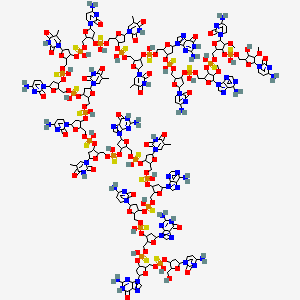m6A-centered Drug Response Information
General Information of the Drug (ID: M6APDG02498)
| Name |
Cenersen
|
||||
|---|---|---|---|---|---|
| Status |
Phase 2
|
||||
| Structure |
 |
||||
|
3D MOL
|
|||||
| PubChem CID | |||||
| TTD Drug ID | |||||
Target Gene(s) and Their Upstream m6A Regulator, Together with the Effect of Target Gene(s) in Drug Response
The target genes involved in drug-target interaction (such as drug-metabolizing enzymes, drug transporters and therapeutic targets) and drug-mediated cell death signaling (including modulating DNA damage and repair capacity, escaping from drug-induced apoptosis, autophagy, cellular metabolic reprogramming, oncogenic bypass signaling, cell microenvironment, cell stemness, etc.) could be regulated by m6A regulator(s) and affected their corresponding drug response. You can browse detailed information on drug-related target gene(s) mediated by m6A regulators.
Cellular tumor antigen p53 (TP53)
Fat mass and obesity-associated protein (FTO)
| In total 1 mechanisms lead to this potential drug response | ||||
| Response Summary | Cellular tumor antigen p53 (TP53) is a therapeutic target for Cenersen. The Fat mass and obesity-associated protein (FTO) has potential in affecting the response of Cenersen through regulating the expression of Cellular tumor antigen p53 (TP53). | [1], [2] | ||
Methyltransferase-like 14 (METTL14)
| In total 1 mechanisms lead to this potential drug response | ||||
| Response Summary | Cellular tumor antigen p53 (TP53) is a therapeutic target for Cenersen. The Methyltransferase-like 14 (METTL14) has potential in affecting the response of Cenersen through regulating the expression of Cellular tumor antigen p53 (TP53). | [2], [3] | ||
Methyltransferase-like 16 (METTL16)
| In total 1 mechanisms lead to this potential drug response | ||||
| Response Summary | Cellular tumor antigen p53 (TP53) is a therapeutic target for Cenersen. The Methyltransferase-like 16 (METTL16) has potential in affecting the response of Cenersen through regulating the expression of Cellular tumor antigen p53 (TP53). | [2], [4] | ||
Methyltransferase-like 3 (METTL3)
| In total 1 mechanisms lead to this potential drug response | ||||
| Response Summary | Cellular tumor antigen p53 (TP53) is a therapeutic target for Cenersen. The Methyltransferase-like 3 (METTL3) has potential in affecting the response of Cenersen through regulating the expression of Cellular tumor antigen p53 (TP53). | [2], [5] | ||
RNA demethylase ALKBH5 (ALKBH5)
| In total 1 mechanisms lead to this potential drug response | ||||
| Response Summary | Cellular tumor antigen p53 (TP53) is a therapeutic target for Cenersen. The RNA demethylase ALKBH5 (ALKBH5) has potential in affecting the response of Cenersen through regulating the expression of Cellular tumor antigen p53 (TP53). | [2], [6] | ||
YTH domain-containing family protein 1 (YTHDF1)
| In total 1 mechanisms lead to this potential drug response | ||||
| Response Summary | Cellular tumor antigen p53 (TP53) is a therapeutic target for Cenersen. The YTH domain-containing family protein 1 (YTHDF1) has potential in affecting the response of Cenersen through regulating the expression of Cellular tumor antigen p53 (TP53). | [2], [7] | ||
References